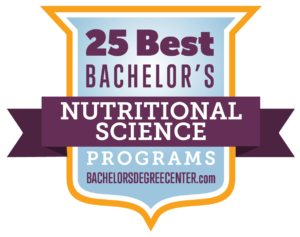
Key Information:
- UNC Chapel Hill has the #1 best nutritional science bachelor’s degree.
- Graduates are prepared for diverse roles in healthcare, food industry, and wellness sectors, including positions like nutritionists or health advisors.
- A bachelor’s in nutritional sciences provides a solid base for advanced studies in fields such as dietetics, public health, or specialized areas of nutrition.
Nutrition and dietetics is one of the fastest-growing career paths in the US right now; according to the BLS, the job market for nutritionists is expected to grow by 15% in the next decade, much faster than average. There are a lot of reasons, including the much-discussed “graying of America” as Baby Boomers age, as well as more widespread knowledge and understanding of the importance of good nutrition to every aspect of health and life. As Americans fight obesity, cancer, heart disease, and other nutrition-related illnesses, the role for dietitians and nutritionists is only going to be more important.
Nutrition is also one of the most misunderstood careers, for those outside of the field (see our FAQs after the ranking for explanations of dietetics degree vs nutrition degree, the role of a nutritionist/dietician, and more). For students who may be interested in nutrition, but aren’t quite clear on how to go about getting into a nutrition career, Bachelor’s Degree Center has put together a ranking of the best nutrition/dietetics programs in the US that are sure to offer a solid return on investment.
Methodology: Ranking the Best Universities for Dietetics and Nutrition
To rank the 25 Best Bachelor’s in Nutritional Sciences Degree Programs, Bachelor’s Degree Center editors began by researching all of the nutrition and dietetics program in the US accredited by the Accreditation Council for Education in Nutrition and Dietetics (ACEND). From there, programs were ranked across 5 criteria to determine the overall best:
- Reputation (Niche student reviews)
- Cost (IPEDS data)
- Alumni Salary (College Scorecard data)
- Graduation Rate (IPEDS data)
- Job Placement (IPEDS data)
With this broad range of qualifiers, students can feel confident that the programs reviewed by Bachelor’s Degree Center are not only recognized for quality, but have proven job market and career success.
Dietetics vs. Nutrition: What’s the Difference in 2026?
| Category | Dietetics | Nutrition |
|---|---|---|
| Scope of Practice | Provides medical nutrition therapy (MNT), meal planning, and clinical interventions for disease prevention and treatment in hospitals, clinics, and public health settings. | Focuses on general wellness, food science, and lifestyle guidance; may work in community programs, wellness coaching, education, or food industry roles. |
| Education | Requires an ACEND-accredited graduate degree, supervised practice (≥1,000 hours), and passing the CDR national exam to become an RDN. | May require a bachelor’s degree in nutrition or related field; no national standard for supervised practice, though advanced certifications are common. |
| Licensure / Title Protection | Title “Registered Dietitian Nutritionist (RDN)” is legally protected; practice is regulated in most U.S. states. | Title “Nutritionist” is regulated in only some states; requirements vary, and the scope of practice is generally broader but less clinical. |
Top 10 Best Universities for Nutrition and Dietetics Programs (2026)
| Rank | University | Degree / Track | Path Type | ACEND Status | Supervised Practice Included? | Degree Level | Cost (per credit hour)* | Exam / Match Rate | Distinctive Features |
|---|---|---|---|---|---|---|---|---|---|
| 1 | University of North Carolina – Chapel Hill | B.S. in Public Health – Nutrition | DPD / Option for BSPH–MS (5‑year) | ✅ Accredited (ACEND) | ❌ Separate internship required | Bachelor’s / Accelerated Master’s | ≈ $390 in-state | >90 % placement | Top public-health nutrition program; strong research and MD prep track |
| 2 | Purdue University | B.S. in Nutrition Science (4 concentrations) + Coordinated Program in Dietetics | CP + DPD | ✅ Accredited (ACEND) | ✅ Built-in practice (CP track) | Bachelor’s / Accelerated M.S. | ≈ $370 in-state | >95 % placement | Cancer nutrition research leader; robust internships |
| 3 | James Madison University | B.S. in Dietetics | DPD | ✅ Accredited (ACEND) | ❌ Separate DI needed | Bachelor’s | ≈ $325 in-state | 95 % first-time pass | 95 % exam pass rate; state-of-the-art food labs |
| 4 | University of Texas at Austin | B.S. in Nutrition (DPD & Coordinated options) | CP or DPD | ✅ Accredited (ACEND) | ✅ CP includes internship | Bachelor’s | ≈ $365 in-state | >90 % placement | Public-health nutrition track; research credit options |
| 5 | University of Washington | B.A. in Food Systems, Nutrition & Health | DPD | ✅ Accredited (ACEND) | ❌ Separate DI required | Bachelor’s | ≈ $375 in-state | 96 % job placement (1 yr) | Integrates nutrition with policy & sustainability |
| 6 | University of Minnesota | B.S. in Nutrition (DPD / Science / Studies sub-plans) | DPD | ✅ Accredited (ACEND) | ❌ Separate DI required | Bachelor’s | ≈ $430 in-state | 90 % placement | Research hub for food innovation (Honeycrisp apple program) |
| 7 | University of Connecticut | B.S. in Dietetics or Nutritional Sciences | DPD | ✅ Accredited (ACEND) | ❌ Separate DI required | Bachelor’s | ≈ $395 in-state | 84 % intern match | Strong sport & exercise nutrition minor |
| 8 | Ohio State University | B.S. in Human Nutrition (3 tracks) | DPD | ✅ Accredited (ACEND) | ❌ Separate DI required | Bachelor’s | ≈ $360 in-state | >90 % placement | Six nutrition programs under College of Education & Human Ecology |
| 9 | University of Missouri – Columbia | B.S. in Nutrition & Food or B.S.–M.S. Dietetics (5‑yr) | CP / Accelerated BS–MS | ✅ Accredited (ACEND) | ✅ Integrated practice | Bachelor’s / Master’s | ≈ $335 in-state | 92 % pass | MU Nutritional Center for Health (MUNCH) hands-on training |
| 10 | University of Pittsburgh | B.S. in Nutrition Science (transitioning to M.S.) | DPD → Graduate Program | ✅ Accredited (ACEND) | ❌ B.S. requires separate DI / M.S. includes practice | Bachelor’s / Master’s | ≈ $415 in-state | High UPMC placement | Partnership with UPMC; new graduate CP pathway |
1. University of North Carolina at Chapel Hill

The University of North Carolina’s BS in Public Health, with a Nutrition major, comes from one of the best universities for dietetic and nutrition in the world, and the USA’s highest-ranked public health school. Since it comes from a public health school, UNC’s bachelor’s in nutrition program puts a great deal of emphasis on understanding the larger contexts of nutrition, especially nutrition-related illnesses and epidemiology. Graduates frequently go on to medical school, but UNC also offers a 5‑year BSPH-MS program that allows students to earn their master’s with just one more year of school.
The University of North Carolina at Chapel Hill one of the three institutions that claim the title of America’s first public university, and more than two and a half centuries later, UNC is still central to research, learning, and culture not only in the Carolinas, but across the US. UNC Health Care is one of the world’s foremost academic health complexes, and their medical, biomedical, and other health sciences program rival any other institution. Being one of the best colleges for nutrition is just part of the larger, global whole.
Degree: BS in Public Health — Nutrition
Click to learn more about the nutrition degree!
2. Purdue University

Purdue University’s bachelor’s in nutrition program offers several options for in research and practice. The Nutrition Science program prepares students for careers such as chemist and research assistant and meets the admission requirements for most graduate-level health programs. The Foods and Nutrition in Business program train students for occupations such as food editor, food and nutrition consumer educator, and public relations director in a food company. Other options are available, including four programs for students who wish to become registered dietitians (RDs). One of those is a Coordinated Program in Dietetics (CPD), which covers both the didactic requirements and the supervised practice required to sit for the exam to become a Registered Dietitian.
The Nutrition Science department is especially known for its research in cancer prevention and carcinogenesis; food, nutrition, obesity and metabolism; and Vitamin D, minerals, and bone health. The department is a proponent of lifelong learning and finding practical applications for discoveries made in the lab. With its high job placement rates and abundant opportunities for internships in dietetics, Purdue is clearly one of the best universities for dietetics and nutrition.
Degree: BS — numerous concentrations
Click to learn more about the nutrition degree!
3. James Madison University

The Department of Health Professions offers James Madison University’s Bachelors in Dietetics. This ACEND-accredited bachelor of science satisfies the requirements for a Didactic Program in Dietetics (DPD) for students who desire to become RDs. The program offers opportunities for students to use their creativity, problem-solving, and decision-making skills to complete research projects, case studies, and other classroom experiences. A hospital-based practicum proves real-life experiences for all students enrolled in the program.
The College of Health and Behavioral Studies has a state-of-the-art food lab to enable students to participate in research projects and learn about food science. The school has a 95% first-time pass rate on the registration exam and approximately 65–75% of students are successfully matched with internship programs in dietetics. The College of Health and Behavioral Studies promotes opportunities for research, practice, and interdisciplinary study, one of the best colleges for nutrition.
Degree: BS in Dietetics
Click to learn more about the nutrition degree!
4. University of Texas at Austin

The College of Natural Sciences offers the University of Texas at Austin’s Bachelors in Nutrition. For the dietetics option, students can choose the Didactic Program in Dietetics or the Coordinated Program in Dietetics (CPD). Both programs are ACEND-accredited and prepare the student to sit for the RD test, but the CPD program also includes a supervised practice component that satisfies the internship requirement. The other options UT Austin offers for students interested in nutrition and dietetics are Nutritional Sciences; Nutrition and Public Health; Honors in Advanced Nutritional Sciences; Nutrition Honors; and International Nutrition.
The College of Natural Sciences provides opportunities for students to participate in research in its state-of-the-art research facilities. As one of the best universities for dietetics and nutrition, UT Austin offers students access to well-known and respected scientists to complete projects and are able to earn university credit and departmental honors for outstanding research.
Degree: BS in Nutrition
Click to learn more about the nutrition degree!
5. University of Washington

The School of Public Health is the home of the University of Washington’s BA in Food Systems, Nutrition, and Health. This bachelor’s in nutrition program is interdisciplinary and helps students make connections between food, health, economics, policy, social justice, labor, public health, culture, and more. Graduates of the program will have a thorough understanding of nutrition, as well as how food systems work, the importance of sustainability in food production, and public health issues related to food. The program also provides a strong liberal arts background that instills essential skills such as communication, analysis, problem-solving, and critical thinking.
The University of Washington’s School of Public Health has over 50 centers and Institutes that enable faculty members from various departments to collaborate on interdisciplinary research studies. For example, the Center for Public Health Nutrition performs research on obesity; food prices and environments; and food security. The School of Public Health has a 96% one-year job placement rate for graduates who were seeking employment and is one of the best colleges for nutrition in the Pacific Northwest.
Degree: BA in Food Systems, Nutrition, and Health
Click to learn more about the nutrition degree!
6. University of Minnesota

The University of Minnesota BS in Nutrition comes from the College of Food, Agriculture and Natural Resource Sciences (CFANS). Students in the bachelor’s in nutrition program can apply for one of three sub-plans after completing the first 60 credits in the nutrition program. The sub-plans are the Didactic Program in Dietetics (DPD), Nutritional Science, and Nutrition Studies. The didactic program is for students who plan to complete the requirements to become registered dietitians. The nutritional science program prepares students to enter graduate programs such as pharmacy, nutrition research, dentistry, and medicine. The nutrition studies sub-plan allows some flexibility for students to design their own bachelors degree in nutrition by including 24–30 elective credits of the student’s choosing.
The University of Minnesota has long been one of the best universities for dietetics and nutrition, and is a leading research institution in food production as well. CFANS at the University of Minnesota has a long history of creating new food and agricultural products and processes. A good example is the Honeycrisp apple and its new derivative, the First Kiss apple, which has the taste of a Honeycrisp but ripens earlier.
Degree: BS in Nutrition
Click to learn more about the nutrition degree!
7. University of Connecticut

University of Connecticut’s College of Agriculture, Health, and Natural Resources house the Department of Nutritional Sciences. The department offers two areas of emphasis at the bachelor degree level, Dietetics (Didactic Program) and Nutritional Sciences. The Nutritional Sciences programs give students a strong foundation in food science, nutrition, wellness, and health promotion, earning UConn a reputation as one of the best colleges for nutrition. Related minors available at UConn are Food Science and Nutrition for Exercise and Sport.
The UConn Didactic Program in Dietetics holds accreditation by the Accreditation Council for Education in Nutrition and Dietetics. The placement rate for dietetic internships is higher than average at 84%. The Department of Nutritional Sciences strives to provide a quality education that enables students to excel in their real-world employment following graduation. In addition to learning about their major area of study, students learn valuable skills such as teamwork, critical thinking, communication, and service.
Degree: BS in Dietetics or BS in Nutritional Sciences
Click to learn more about the nutrition degree!
8. Ohio State University
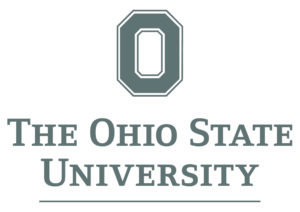
With six degree programs to choose from, Ohio State University is one of the best universities for dietetics and nutrition. The Department of Human Sciences at the College of Education and Human Ecology at offers OSU’s bachelor’s in nutrition with four different specializations. They are: Bachelor of Science in Human Nutrition, Dietetics; Bachelor of Science in Human Nutrition, Nutrition in Industry; Bachelor of Science in Human Nutrition, Nutritional Sciences; and Bachelor of Science in Health Promotion, Nutrition and Exercise Science.
The OSU College of Education and Human Ecology is committed to providing all students with the best possible education. The school attracts high-achieving students by providing research and mentoring opportunities. Students are encouraged to participate in an assortment of student organizations and engage in community service to gain real-world experiences to help them develop their skills. OSU is clearly one of the best universities for dietetics and nutrition.
Degree: BS in Human Nutrition — Dietetics, Nutrition in Industry, or Nutritional Sciences
9. University of Missouri — Columbia

The Department of Nutrition and Exercise Physiology presents the University of Missouri BS in Nutrition and Food that prepares students for a future in community nutrition or fitness. Students who do well in this program are eligible to participate in the Nutrition and Fitness Internship Program, which allows students to gain experience working in a corporation, clinic, fitness center, or other organization. The school also offers a BS-MS Dietetics program. Students who complete the program earn both a BS in Nutrition and Food and an MS in Dietetics in just 5 years and continue the process to become Registered Dietitians.
Missouri’s flagship public research institution, the University of Missouri is crucial to professional education in the state and one of the best colleges for nutrition. The Nutrition and Exercise Physiology Department is home to the MU Nutritional Center for Health (MUNCH), which offers a teaching kitchen, a metabolic research kitchen, a wet lab for chemical experiments, and an observational research lab. These facilities enable students and faculty to engage in a wide range of research activities related to nutrition and dietetics.
Degree: BS in Nutrition and Food or BS-MS 5 year program
Click to learn more about the nutrition degree!
10. University of Pittsburgh

The University of Pittsburgh’s Nutrition and Dietetics Program, one of the best schools of its kind in the nation, is in the midst of an overhaul that will provide even more opportunity to students. In addition, to comply with new ACEND accreditation standards, the School of Health and Rehabilitation Sciences at Pitt is discontinuing its Didactic Dietician Nutritionist Program and replacing it with their new Dietician Nutritionist Program, which is a master’s level program that meets the new guidelines. The bachelor’s program will be replaced with a new BS in Nutrition Science starting in 2019, built on the same tradition of excellence as the current bachelor’s program.
The School of Health and Rehabilitation Sciences provides an unrivaled environment for superior education and training. The school values innovation, service, integrity, inclusion, advocacy, and excellence. SHRS has a partnership with the University of Pittsburgh Medical Center (UPMC). This allows SHRS students to receive priority consideration when applying for clinical internships at UPMC, one of the best universities for dietetics and nutrition.
Degree: BS in Nutrition Science
Click to learn more about the nutrition degree!
11. University of Vermont

The University of Vermont’s BS in Nutrition and Food Sciences (NFS) and BS in Dietetics, Nutrition and Food Sciences (DNFS) come from the College of Agriculture and Life Sciences. The NFS bachelor’s in nutrition is great for students who want to pursue careers with food as a focus without becoming Registered Dietitians. The DNFS program is an ACEND-accredited didactic bachelor’s in dietetics and meets the standards set forth for the educational component of the path to becoming a Registered Dietitian.
The College of Agriculture and Life Sciences believes in learning by doing, which makes UVM one of the best universities for dietetics and nutrition. One is the Applied Research Methods course, in which students are expected to complete a full research project for a community partner throughout the duration of the course. The NSF is often used as a pre-med program for those who want to pursue a graduate degree in a health-related field, while the DNFS program gives students a solid foundation in the sciences while providing expertise in the area of food and nutrition.
Degree: BS in Nutrition and Food Science or BS in Dietetics, Nutrition, and Food Science
Click to learn more about the nutrition degree!
12. Washington State University

The Washington State University BS in Nutrition and Exercise Physiology, offered by the Elson S. Floyd College of Medicine, qualifies students to take the exam to become Certified Exercise Physiologists (EP‑C). The BS in Nutrition and Exercise Physiology also prepares students for graduate programs in fields such as public health, dietetics, physical or occupational therapy, and medicine.
The Elson S. Floyd College of Medicine looks for applicants who have a connection to the state of Washington and are motivated to improve the health and well-being of the state’s residents. Students from the Department of Nutrition and Exercise Science (NEP) are doing just that, at one of the best colleges for nutrition. They started a garden that provides a continuous supply of fresh produce to the on-campus food pantry to help WSU and EWU students suffering from food insecurity.
Degree: BS in Nutrition and Exercise Physiology
Click to learn more about the nutrition degree!
13. Rowan University
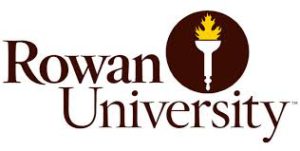
Another of the best colleges for nutrition, Rowan University’s BS in Nutrition includes a choice between two specialties: Exercise Science or Dietetics. The Exercise Science program trains students for careers are nutrition counselors, educators, and nutrition specialists. Graduates obtain work in hospitals, community wellness programs, fitness centers, and more. This program also prepares students to enter graduate programs in nutrition, public health, and health promotion. The Dietetics specialization satisfies the first step required to pursue an MS in Nutrition and Dietetics and become a Registered Dietician.
The School of Health Professions at Rowan University strives to be a leader in student-centered education. The school uses a research-rich environment for teaching and is committed to excellence in the creation of its degree programs. The School of Health Professions is committed to engaging in high-quality research, appreciating the diversity of its students, and providing opportunities for STEM education. The school aims to provide outstanding preparation for students to pursue careers in research, industry, health care, education, and public service.
Degree: BS in Nutrition — Exercise Science or Dietetics
Click to learn more about the nutrition degree!
14. Colorado State University

Colorado State University’s BS in Nutrition and Food Science, from the College of Health and Human Sciences, assimilates the fields of chemistry, health sciences, and biology. Graduates are prepared to assist others to make improvements in the quality of their lives. Degree candidates have the option of selecting a concentration from among the following: Food Safety and Nutrition and Fitness, Nutritional Sciences and Dietetics and Nutrition Management. Students can choose to complete a Gerontology Interdisciplinary Minor.
Colorado State University was established as a land-grant university in 1870, arising from the Morrill Act. It is the flagship school of the Colorado State University system. Consumers Digest ranks among the best top value public universities. CSU’s main 580+-acre urban campus is home to nearly 34,000 students. The College of Health and Human Sciences has elevated CSU to one of the best universities for dietetics and nutrition.
Degree: BS in Nutrition and Food Science
Click to learn more about the nutrition degree!
15. University of Illinois at Chicago

The University of Illinois at Chicago’s BS in Nutrition program offers two coursework tracks depending on the student’s preferred career choice. The first pathway a student can choose prepares graduates to become a Registered Dietitian; the second is the Nutrition Science track. This coursework, from one of the best colleges for nutrition, works well for those students reaching for more advanced degrees, a career in the food industry, or nutrition research. More than ¾ of UIC’s nutrition science grads find internships in the dietetic industry. This is significantly higher than the national average of 50%.
The University of Illinois at Chicago is a public university established in 1859 and chartered in Champaign-Urbana in 1867. UIC’s medical school is the largest in the nation with research expenditures exceeding $400+ million. The school is comprised of three campuses that is home to 2,400 faculty and more than 28,000 students. UIC’s BS in Nutrition program has received accreditation from the Accreditation Council for Education in Nutrition and Dietetics (ACEND).
Degree: BS in Nutrition — Nutrition, Coordinated, or Didactic Dietetics
Click to learn more about the nutrition degree!
16. Texas Christian University
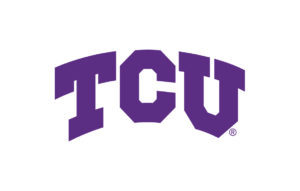
Texas Christian University’s BS in Nutrition Sciences offers five areas of concentration. Students can opt for the Coordinated Program in Dietetics, the Combined BS/MS in Dietetics, the Didactic Program in Dietetics, the Nutrition Major and the Food Management program. Students are required to complete an extensive research project with the guidance of their faculty mentor before graduating. Students have the opportunity to practice hands-on skills in the direction of their faculty advisor while attending one of the best universities for dietetics and nutrition.
Texas Christian University was founded as a Christian-based institution of higher learning in 1873. The school’s urban 320+-acre campus is only three miles from downtown Fort Worth. The university is comprised of eight colleges founded on a traditional liberal arts curriculum. TCU is among the best universities for dietetics and nutrition, according to US News and World Report.
Degree: BS in Nutrition Science — 5 concentrations
Click to learn more about the nutrition degree!
17. North Dakota State University

North Dakota State University’s BS in Dietetics is known as the Dietitian Education Program (DEP) Option. Additionally, NDSU has created an Accelerated BS/MS for Dietetics and Nutrition. This bachelors in nutrition program’s coursework delivers clinical experiences (1,400 hours) and extensive academic competencies. North Dakota State University’s BS in Nutrition program has received accreditation from the Accreditation Council for Education in Nutrition and Dietetics (ACEND). For students interested in furthering their studies should explore the Didactic Program in Dietetics (DPD) option, a Post Bachelor’s Internship with highly selective admission protocols.
North Dakota State University is a land-grant university that was established in 1890. It is the flagship school and one of the largest schools within the North Dakota University System. In addition to earning a reputation as one of the best colleges for nutrition, NDSU has the support of Forbes, which recognizes Fargo, ND, as the #5 college town in the US for jobs.
Degree: BS in Dietetics or Accelerated BS-MS
Click to learn more about the nutrition degree!
18. University of Montevallo

The University of Montevallo’s BS in Exercise and Nutrition Science (EXNS) offers a Coordinated Program in Dietetics (CPD). Course work is developed to the standards required by the school’s accreditation from the Accreditation Council for Education in Nutrition and Dietetics (ACEND). Degree candidates studying for the bachelor’s in nutrition program are primed for success and ready to take the Registered Dietitian examination. Graduates understand the interdependence of food, nutrition, and dietetics with regards to healthy living for individuals and families.
The University of Montevallo was established in 1896 as a public liberal arts institution of higher learning. The school holds the distinction as being the only legislatively chartered public institution in the state of Alabama. For more than ten years, US News & World Report ranks the University of Montevallo as one of Alabama’s highest-ranked graduate-level institutions, and one of the best universities for dietetics and nutrition. UM’s rural campus is home to more than 3,000 students and centrally located in an area that is rich with Civil War history.
Degree: BS in Exercise and Nutrition Science
Click to learn more about the nutrition degree!
19. Grand Valley State University

The Department of Biomedical Sciences offers Grand Valley State University’s BS in Biomedical Sciences with a focus on Nutrition. Ultimately, degree candidates graduate with a deep understanding of human life sciences as a whole. The BS Nutrition emphasized degree focuses its curriculum on Physiology, Anatomy, Nutrition, and Microbiology. Research, from one of the best colleges for nutrition studies, areas include cancer biology, immunology, bacterial genetics, and obesity, among others.
Grand Valley State University is a liberal arts university that was established in 1960. GVSU’s main campus is in Allendale, about 12 miles from downtown Grand Rapids. The school is considered one of the top 100 largest in the country. Grand Valley State University has received regional accreditation for the North Central Association of Colleges and Schools (NCACAS) and is recognized as one of the best colleges for nutrition.
Degree: BS in Biomedical Sciences — Nutrition emphasis
Click to learn more about the nutrition degree!
20. University of Mississippi

The University of Mississippi BS in Dietetics and Nutrition is designed to integrate the principles of sciences with healthy living and food preparation. Students receive exceptional education as the student-faculty ratio is 10:1, providing ample opportunity for mentorship and student participation in real, ongoing research. Bachelor’s in nutrition students can also opt for a further specialty in Health Science, Dietetics, and Child Nutrition. One of the best universities for dietetics and nutrition, Ole Miss is central to the field in Mississippi.
The University of Mississippi is a research, space-grant, sea-grant public university that was established in 1848. The school is the largest university in the state by enrollment and one of the most influential institutions in the Deep South. Ole Miss was considered one of the safest schools in the Southeast Conference, and the country. The school operates five campuses throughout Mississippi; the main campus is in Oxford, with satellite campuses in Tupelo, Grenada, Desoto, and Bonneville.
Degree: BS in Dietetics and Nutrition
Click to learn more about the nutrition degree!
21. University of Kentucky

The University of Kentucky BS in Human Nutrition program prepares graduates to enter the job market ready to serve in the many facets of the nutrition/healthcare industry: Food Policy, Pharmaceutical Development, Nutritional Supplements, Regulatory Services, among other health-related professions. The University of Kentucky has received accreditation from the Southern Association of Colleges and Schools (SACS) Commission on Colleges).
The University of Kentucky is a land-grant university established in 1865; one of the two land-grant universities in the state. The University of Kentucky is the state’s largest institution of higher learning. The university is comprised of sixteen schools plus a graduate school. The University of Kentucky is a member school the Southeastern Conference, a coordinated effort to advance the quality of academic programs offered by member schools.
Degree: BS in Human Nutrition
22. University of Massachusetts Lowell
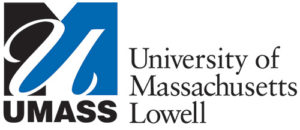
The University of Massachusetts Lowell’s BS in Nutritional Science, from the College of Health Sciences Department of Biomedical and Nutritional Sciences, focuses on how nutrition and diet (dietary patterns) impacts the body’s metabolism and biochemistry. The program seeks to appropriately prepare graduates for a variety of career paths in the field of nutrition and to offer a platform for professional growth. The University of Massachusetts Lowell received accreditation by the Accreditation Council for Education in Nutrition and Dietetics (ACEND).
The University of Massachusetts Lowell is a public institution of higher learning established in 1894. The school has received regional accreditation from the New England Association of Schools and Colleges (NEASC). UMass Lowell holds the distinction of the second-largest university in the Commonwealth of Massachusetts, in addition to one of the best colleges for nutrition. The University of Massachusetts Lowell’s BS in Nutritional Science is the perfect degree program to prepare students reaching for graduate and postgraduate degrees in the dynamic field of Nutritional Sciences.
Degree: BS in Nutritional Sciences – with accelerated option to MPH in Dietetics
Click to learn more about the nutrition degree!
23. University of Idaho

The University of Idaho’s BS in Food and Nutrition comes from the Margaret Richie School of Family and Consumer Sciences, one of the best colleges for nutrition in the world. The BS in Nutrition focuses on the human body’s biochemistry and the body’s reaction to food and nutrition. The University of Idaho’s nutritional undergraduate degrees have received accreditation from the Accreditation Council for Education in Nutrition and Dietetics (ACEND). Graduates from one of the best universities for dietetics and nutrition are eligible to sit for the Registered Dietitian Nutritionist national examination.
The University of Idaho is the state of Idaho’s oldest institute of higher learning. It was established as a land-grant school in 1889 by the Territorial legislature to bring modern farming and technology to the frontier. Today UI is Idaho’s primary research institution of higher learning. Additionally UI’s campus, with more than 1,580-acres, is the biggest in the state of Idaho.
Degree: BS in Food and Nutrition
24. La Salle University
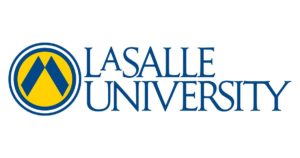
La Salle University’s BS in Dietetics offers students a choice between a Coordinated Program in Dietetics and a Didactic Program in Nutrition. La Salle University’s bachelor’s in nutrition programs have received accredited by the Accreditation Council for Education in Nutrition and Dietetics (ACEND). The Coordinated program prepares students to become Registered Dietitian as they are eligible to sit for the national exam. The Didactic Program prepares graduates for post-baccalaureate practicums that lead to obtaining a license as a Registered Dietitian/Nutritionist (RND) or to take the examination for the credential of Nutrition and Dietetics Technician, registered.
La Salle University is a Roman Catholic school that was established by the Institute of the Christian Schools in 1863. La Salle is affiliated with the Roman Catholic Church of Philadelphia’s Archdiocese. The Economist ranks as one of the top one-hundred schools in the country, and in addition to its many world-class programs, La Salle is known as one of the best universities for dietetics and nutrition.
Degree: BS in Dietetics — Coordinated or Didactic
Click to learn more about the nutrition degree!
25. University of Cincinnati

The University of Cincinnati’s BS in Nutrition & Dietetics is best suited for those students who wish to become Registered Dietitian Nutritionists. The BS in Nutrition & Dietetics prepares graduates with a foundation in medical nutrition therapy, health wellness, nutrition, and food science. The academic mandates of this Didactic Program in Dietetics (DPD) as determined by the Accreditation Council for Education in Nutrition and Dietetics (ACEND) and the Academy of Nutrition and Dietetics (AND).
The University of Cincinnati is the oldest university in the city of Cincinnati, and one of the oldest west of the Mississippi, founded in 1819. With an enrollment that exceeds 44,000, UC is the second-largest school in Ohio and plays a critical role in educating the professional class of Ohio and the Midwest.
Degree: BS in Nutrition and Dietetics
Click to learn more about the nutrition degree!
Career Paths Beyond Clinical Nutrition (2026)
| Career Area | Focus & Work Setting | Sample Job Titles |
|---|---|---|
| Industry & FMCG (Food Manufacturing & Consumer Goods) | Develop, test, and market nutrition-focused products; ensure food labeling compliance; work with R&D and regulatory teams. | Product Development Specialist, Food Scientist, Nutrition Labeling Analyst, Corporate Wellness Consultant |
| Sports & Performance Nutrition | Design evidence-based meal and supplement plans for athletes and active populations in collegiate, professional, or fitness settings. | Sports Dietitian (CSSD), Performance Nutrition Coach, Exercise Nutrition Specialist, Team Nutrition Director |
| Community & Public Health Nutrition | Improve nutrition access and health outcomes through government or nonprofit programs; lead education and outreach initiatives. | Public Health Nutritionist, WIC Program Coordinator, Community Wellness Educator, Nutrition Outreach Specialist |
| Food Policy & Advocacy | Shape legislation, guidelines, and initiatives related to food systems, sustainability, and public health. | Policy Analyst, Food Systems Advocate, Nutrition Program Evaluator, Legislative Researcher |
| Nutrition Informatics & Data Science | Use health data, EHR systems, and analytics to optimize nutrition programs and population health management. | Nutrition Informatics Specialist, Data Analyst (Health & Nutrition), EHR Integration Consultant, Health Technology Researcher |
What is a Nutritionist/Dietitian?
The Academy of Nutrition and Dietetics states that a registered dietitian is a food and nutrition expert who has received a bachelor’s degree, completed an Accreditation Council for Education and Dietetics (ACEND) overseen program lasting 6 to 12 months, passed a national exam, and met continuing professional education requirements. A nutritionist dietitian may have additional certifications in specialized areas, such as pediatrics, renal nutrition, sports dietetics, and diabetes education. Nutritionist responsibilities include determining patient health needs and diet, educating patients about healthy eating and other nutritional areas of concern.
Nutrition Science Degree states the nutrition science definition is the focus on dietary concerns and health issues with food, eating, and medicine. It is based in chemistry, biology, and social science. It is the study of habits and social relationships related to food. Nutrition science covers a large range of areas including wellness, community nutrition, exercise science, and nutrition education. It is the promotion of health and managing diseases. Those in this field educate people on how good food choice leads to a healthy lifestyle.
With a nutrition degree, you may work in clinical nutrition, sports nutrition, food service, and many other areas, according to the Bureau of Labor Statistics. Online programs in higher education, like a bachelor of science in nutritional sciences, can help you make the move into a high-paying field, but be sure you’re choosing the right program. Nutrition degree programs may be offered full-time or part-time, but for financial aid you need an accredited program. You also cannot move on to a master’s degree without a degree from a legitimate school.
What Kind of Education Do I Need to Become a Nutritionist/Dietitian?
In order to understand what type of education is needed to become a nutritionist or dietitian, an individual must first determine his/her goals. If those goals include duties such as nutrition counseling, diagnosing and assessing a client’s needs, and setting goals for better nutrition and health (such as specific diet plans), a registered dietitian may be the route to take. On the other hand, if you are interested in educating or providing advice in food and nutrition, but not working in a medical setting or providing detailed treatments, stay with a nutritionist path. There are several types of bachelor’s degrees in nutrition and dietetics, and it can be difficult to choose between them. Throwing in bachelor’s specializations can make it even more complicated.
The main difference is this: all dietitians are nutritionists, but only nutritionists who have earned their Registered Dietitian license can call themselves “dietitian.” Dietitians are under much more regulation and protection by law, while nutritionists have certain legal restrictions; for instance, a nutritionist can give general nutritional advice, but not write meal plans for patients in a hospital or nursing home. The terms are often used interchangeably, so when looking at a program, an individual who wants to be a dietitian should be sure that it will provide ACEND-accredited coursework requirements.
Dietitian education requirements are at minimum a bachelor’s degree in nutrition or dietetics, which is generally 4 years. A dietitian education also requires 1200 hours of clinical work before being able to sit for the registered dietitian exam. Most importantly all coursework should meet the Accreditation Council for Education in Nutrition and Dietetics (ACEND) accredited coursework requirements. After that, the student must pass the certified dietitian exam. After that, certifications need to be renewed with continuing education. A dietetics certification, which is also known as a registered dietitian nutritionist, therefore requires a bachelor’s degree just like a dietitian.
Why Should I Choose a Dietetics Degree vs Nutrition Degree?
Some schools use the titles dietetics and nutritionist interchangeably when referring to their degree program. Some schools offer both dietetics and a nutritionist degree, leaving many students wondering the difference between a dietetics degree vs nutrition degree. According to the Academy of Nutrition and Dietetics, there are different types of nutrition degrees. There is a didactic program in dietetics, which is a program with coursework to give the students a fundamental education in dietetics practice. Once a student completes the didactic program, the individual can begin a supervised practice program, which is often referred to as clinical hours, followed by the dietitian registration exam. The didactic program itself does not have clinical hours.
A coordinated program in dietetics offers both in a one-degree program — there’s no need to choose a dietetics degree vs nutrition degree. A student gets the fundamental education through coursework and supervised practice, sometimes called competencies, all together in one program. A nutritionist degree is typically an associate’s degree that requires dietetic technician coursework followed by supervised practice. Registered dietitian nutritionist programs can be either coordinated programs and didactic programs in dietetics are bachelor’s or graduate-level degrees. There are post-graduate courses available for a registered dietitian nutritionist that can be used for continuing education.
Related Rankings:
Best Online Nutritional Science Certificate Programs
Most Affordable Nutritional Science Degree Programs
Best Online Nutritional Science Degree Programs
